March 14, 2014
by Carole Zangari -
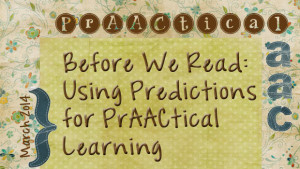
This month, we’re focusing on literacy learning for our Monday posts on Strategy of the Month. In honor of that topic, here’s a quick tip for adding a bit of interaction to book reading. This tip works for books you’ve never read before, or perhaps haven’t read in a really long time. Take a few minutes before the reading begins to predict what the book will be about. We’ll get to the ‘How To’ part in a minute, but first, here’s why we think this is a prAACtical idea. It gets AAC learners thinking about something more than requesting, and we know you are just as passionate about that as we are. It helps the AAC learner activate their background knowledge, something that (we’ve noticed) many of them don’t do automatically. That doesn’t mean that they aren’t capable of it, of course, but it does mean they need practice and... [Read More...]
Filed under: PrAACtical Thinking
Tagged With: literacy, predictions, reading, writing
March 13, 2014
by Carole Zangari -
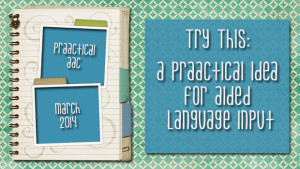
At the ATIA 2014 conference in January, it was exciting to hear about the updates on how core vocabulary is being addressed in the alternate assessment project for Dynamic Learning Maps. Allison Dennis, Dr. Karen Erickson, and Dr. Penny Hatch, of the Center for Literacy and Disability Studies, shared a lot of interesting information, as you can see from their handout. One of my favorite ‘take-aways,’ though, was a suggestion by Karen Erickson regarding the importance of aided language input for students with significant disabilities. We’ve written about aided language input so often that you may be tired of hearing it, but bear with us because her suggestion was pure genius. Ready? Here it is: List aided language input as an accommodation in the IEP. Why List Aided Language Input as an IEP Accommodation? It is a fundamental strategy for any beginning learner of AAC. It is rarely implemented... [Read More...]
Filed under: PrAACtical Thinking
Tagged With: aided language input, ATIA 2014, Karen Erickson
March 12, 2014
by Carole Zangari -
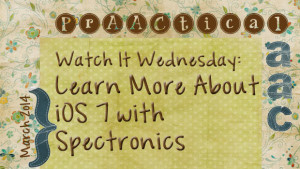
The amazing team at Spectronics has been presenting a terrific set of workshops on iPads for education and special needs. In this week’s featured video, Katie Lyons gives a thorough overview of the iPad and iOS 7. While it is great for people just getting started, there are enough handy tips to make it useful to experienced iPad users, too. We already shared it with a few families and colleagues and they’ve given it rave reviews. At the end of the video, Katie references a Spectronics Blog article by Charlene Cullen on switch use in iOS 7. You can get to that article here. Enjoy!
Filed under: PrAACtical Thinking
Tagged With: iOS, iPad, Katie Lyon, Spectronics
March 11, 2014
by Carole Zangari -
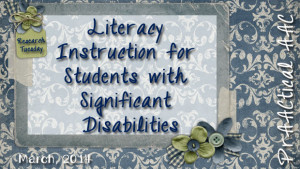
We all remember certain ‘firsts’ – your first bike, your first plane ride, your first car. One of my memorable ‘firsts’ is the first book I was ever given that was ‘just for me.’ I have fond memories of lazy summer afternoons with The Wishing Well, one of the Alice and Jerry basal readers. I may have broadened my library since that was given to me for my 4th birthday, but it still sits on my shelf and just paging through it brings back memories of being transported to another world. We can hardly imagine what life would be like without books. Reading brings us more than information. It allows us to explore, escape, relax, and dream. What must it be like to be deprived of the chance to learn and enjoy the printed word? Sadly, that is the reality for too many children and adults with AAC needs. In... [Read More...]
Filed under: PrAACtical Thinking
Tagged With: literacy, Research Tuesday
March 8, 2014
by Carole Zangari -
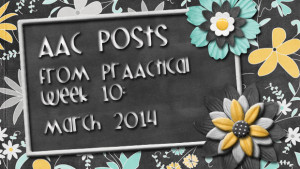
Hope you had an AAC-filled week! Here are some posts you might have missed. Sunday: Video of the Week – Supporting Early Writers Monday: Strategy of the Month – Robust Literacy Instruction for People Who Use AAC Tuesday: Teach Me Tuesday – NOVA Chat Wednesday: 5 Reasons to Put AAC Training for Parents and Staff in the IEP Thursday: AACtual Therapy with Deanna Wagner – Why Cook When You Can’t Eat? Friday: Linguistically-robust AAC Systems
Filed under: PrAACtical Thinking
March 7, 2014
by Carole Zangari -
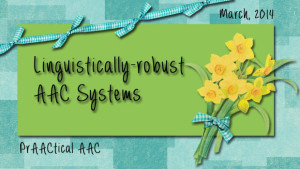
At the NCACA conference last month, a few of us were talking about what it means to have an AAC device or app with a strong language system, something Gail Van Tatenhove and I wrote about a few years ago in this book. Linguistically-robust language systems are those that will allow someone to construct grammatically correct utterances. Think of the different SGDs or AAC apps that you worked with this week. If you could use them to recreate the last 30 minutes of ‘talk time’ that you had without spelling out too many of the words, chances are pretty good that it is a linguistically-robust system. That led to us asking ourselves and others a question. “What do you look for in terms of a language system when you’re considering SGDs or AAC apps for a learner who has the potential to (eventually) construct grammatically correct utterances?” Keep in mind... [Read More...]
Filed under: PrAACtical Thinking
Tagged With: generative language, SGD
March 6, 2014
by Carole Zangari -
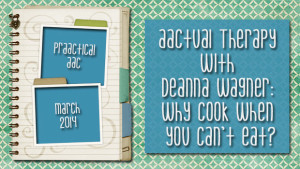
One of our prAACtical friends loves to think about, talk about, and participate in anything to do with baking. Not all that unusual unless you consider that he has a g-tube and doesn’t eat in the conventional sense. So we were incredibly excited have this guest post by SLP Deanna Wagner, whose prAACtical ideas for teaching AAC using cooking activities appealed to us right away. You can read more about Deanna here. Why Cook When You Can’t Eat? I have been thinking about writing this post for a number of weeks, now. And have come up with many different answers to this question, “Why cook when you can’t eat?” I finally decided I should just talk about how we use cooking activities to reinforce communication skills and let the reader can come up with his/her own answer to this question. Whether I am working in a school classroom or with adults... [Read More...]
Filed under: PrAACtical Thinking
Tagged With: AACtual therapy, Deanna Wagner
March 5, 2014
by Carole Zangari -
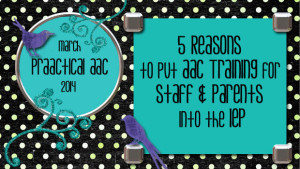
SLPs tend to love (good, relevant) professional development. We flock to conferences (15,000+ ASHA attendees this past November), sign up for workshops, and attend webinars. But for some reason, we are reluctant to request training as part of the IEP process, even when we’re not very confident in our work with the student. Maybe we don’t want to acknowledge our need for it, or admit that there is something we don’t know (gasp!). Perhaps we’d just rather not make waves. We may ask for training informally, but it doesn’t always get tied to specific students’ IEPs, and that may mean that our requests get overlooked. Here are a few reasons why you may want to put staff training into IEPs when needed. We need it. The complexity of the AAC field, diversity of this clinical population, and the rapid pace of change in technology make it very unlikely that any... [Read More...]
Filed under: PrAACtical Thinking
Tagged With: abandonment, IEP, parent training, Training
March 4, 2014
by Carole Zangari -
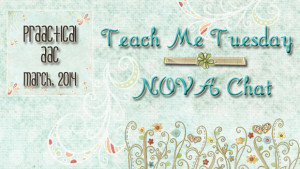
In this Teach Me Tuesday post, we feature a versatile and popular SGD, the NOVA Chat (Saltillo). Come along and learn with us! Product Information for NOVA Chat 10, 7, and 5 Video Tutorials Webinars Facebook – Users Group Knowledge Base Where to Go for Help More Interactive Support for NOVA Chat Free live online product training https://www.prentrom.com/onlinetraining/products Free interactive self-study courses https://www.prentrom.com/training/courses Current PRC product tutorials: Accent Line and Eco2 http://www.youtube.com/playlist?list=PLeOTpEi0oXbhmtDfAHFZvGPkxFuoUSUuv
Filed under: PrAACtical Thinking
Tagged With: NOVA Chat, Saltillo, Teach Me Tuesday
March 1, 2014
by Carole Zangari -
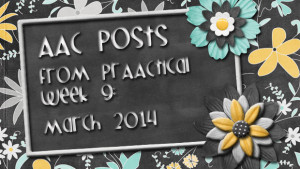
Sunday: Video of the Week – Direct Selection Using Laser Pointers Monday: Strategy of the Month – The Power of Positive Reinforcement Tuesday: A PrAACtical Look at Access YouTube Wednesday: Understanding Rett Syndrome bySally-Ann Garrett Thursday: A Day in the Life of an AAC Chick SLP Friday: Make it PrAACtical – DIY Cellphone Stand
Filed under: PrAACtical Thinking









